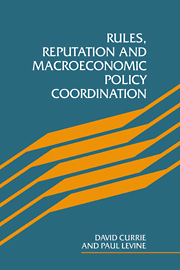Book contents
- Frontmatter
- Contents
- Acknowledgements
- Introduction
- Part I General issues
- Part II Theory and methodology
- Part III Fiscal and monetary policy in interdependent economies
- 8 Macroeconomic policy design in an interdependent world
- 9 Does international macroeconomic policy coordination pay and is it sustainable?: a two-country analysis
- 10 International cooperation and reputation in an empirical two-bloc model
- 11 Fiscal policy coordination, inflation and reputation in a natural rate world
- 12 The use of simple rules for international policy coordination
- 13 Evaluating the extended target zone proposal for the G3
- Bibliography
- Index
11 - Fiscal policy coordination, inflation and reputation in a natural rate world
Published online by Cambridge University Press: 03 December 2009
- Frontmatter
- Contents
- Acknowledgements
- Introduction
- Part I General issues
- Part II Theory and methodology
- Part III Fiscal and monetary policy in interdependent economies
- 8 Macroeconomic policy design in an interdependent world
- 9 Does international macroeconomic policy coordination pay and is it sustainable?: a two-country analysis
- 10 International cooperation and reputation in an empirical two-bloc model
- 11 Fiscal policy coordination, inflation and reputation in a natural rate world
- 12 The use of simple rules for international policy coordination
- 13 Evaluating the extended target zone proposal for the G3
- Bibliography
- Index
Summary
Introduction
In the past few years, the literature concerned with international macro-economic policy coordination has developed and expanded very considerably. It has, in particular, developed in two important respects. First, whereas the earlier pioneering literature (see, for example, the work of Hamada, collected in Hamada (1985)) dealt with simple analytical, and usually static, models of interdependence, the recent literature has emphasised the dynamic aspects of the problem of policy coordination, and has developed techniques for their analysis in the context of empirical multi-country models. Second, the recent literature has grappled with the issues raised by rational expectations, particularly with questions of credibility and sustainability of cooperative policies. The latter focus has emphasised the importance of reputation in the appraisal and design of international policy.
In this context, reputational policies are those which rely on the credibility of government announcements about future policy actions. Formally, if governments are assumed to maximise a given objective function, optimal reputational policies can be derived using Pontryagin's maximum principle. Such policies correspond to the full optimal rule, or, in the terms of Barro and Gordon (1983b), the ideal rule. They are frequently regarded as time inconsistent in that an incentive to renege may emerge with the mere lapse of time. However, if the cost of reneging is a loss of reputational for all time, then such policies may well turn out to lead to worse results than under a reputational but time-inconsistent regime. This may also be true if reputation can be regained after some time. Because of this, reputational policies are of interest.
- Type
- Chapter
- Information
- Rules, Reputation and Macroeconomic Policy Coordination , pp. 321 - 346Publisher: Cambridge University PressPrint publication year: 1993

